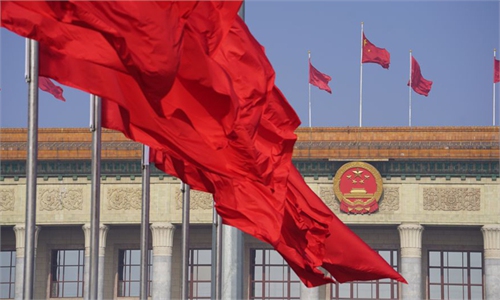China announces stronger punishment for bribers, may 'blacklist' them in market access

anti-graft Photo: VCG
China is strengthening punishment on bribers, with measures including establishing a "blacklist" and holding such people legally responsible, said the Central Commission for Discipline Inspection (CCDI) of the Communist Party of China (CPC) in a document published on Wednesday, a move that experts said will add to China's progress in the anti-graft campaign.
It stressed the need to resolutely investigate and punish the act of offering bribes, especially by CPC members and government officials and offering bribes in key state projects, and on large and repeated bribes in particular.
Bribers in major commercial cases and in important fields will also be highlighted in the investigation, including finance, production safety, food and medicine, disaster relief, social security, education and medical care.
The document urged an improvement in the system for punishing bribe givers, and for promoting law-based investigation of both of those offering and receiving bribes.
An internal control and supervision mechanism for bribers will be established, and the procuratorial and judicial organs will intensify the application and enforcement of property penalties on them, said the document.
Authorities will carry out research on market access and qualification restrictions for those found to be offering bribes, and explore the implementation of a "blacklist" for them, it said.
Zhuang Deshui, deputy director of the Research Center for Government Integrity-Building at Peking University, told the Global Times on Wednesday that the new document will provide institutional guidance for the anti-corruption practices of local governments at all levels, and the establishment of a briber "blacklist" will help fundamentally address the corruption problem in China.
People who offer large bribes are usually "unscrupulous businessmen" who seek shelter and benefits from the government for their economic activities, said Zhuang, adding that restricting and punishing such people is now an important aspect of China's anti-corruption campaign.
"China has already achieved great progress in dealing with corrupt officials who take bribes, and now we need to step up efforts to crack down on those who bribe them," he said.
"It is conducive to creating a healthy social environment for economic development, establishing a market order for fair competition, and a friendly and clean relationship between the government and enterprises," said a CCDI official, according to a statement on CCDI website.
The anti-graft campaign has continued to gain momentum in China in recent years.
A major publication on the CPC's mission and contributions released on August 26 said the CPC will reinforce its ability to resist corruption, allowing no safe haven and showing no tolerance in fighting corruption.
The case of Zhou Jiangyong, the Party chief of Hangzhou, East China's Zhejiang Province, was one that attracted huge public attention recently in the country. Zhou was put under investigation on suspicion of serious violations of laws and Party discipline in August.
Hangzhou's anti-graft authority launched a special campaign to address problems in establishing a close but clear relationship between the government and the business sector.


